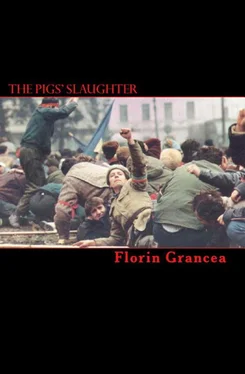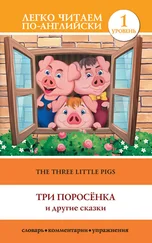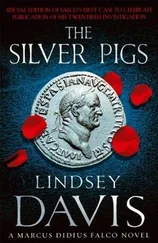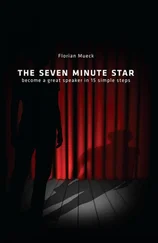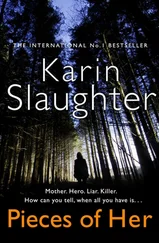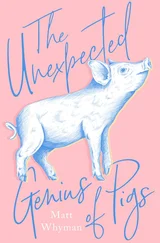In the end, Uncle Lulu was almost right, but still, with fingers crossed, we had enough for everyone who came to pay their respects. “Odihneasca-se in pace” (Rest in peace), the people said, and those were exactly the same words that the bread deliverymen used as a goodbye.
The deliverymen moved on for they were late. That day everybody would wait an hour more in front of the bread shop, but not so impatient as usual. They would already have butter rolls at home thanks to their family members who had seen my grandfather off on his last journey.
Back upstairs Felicia was still watching the Revolution live on the blaring black and white TV. I was there only to steal a candy from the box with the Christmas tree ornaments. Those candies came wrapped in bright colored paper and their purpose was to hang in the Christmas tree. I remember that when I was little they used to be chocolate candies. Then, when I entered school in 1982 they turned in chocolate covered jelly, and then, after 86’ they were just sugar candies. They could just as well use sugar candies, chocolate was too expensive for the people, Ceauşescu had thought one day…
But they were something I could play with. I had discovered that I could replace the candy inside the wrapper with a piece of paper, and the effect would be the same, so every now and then I was indulging myself in the sweets. Not as often as I wished. Those candies were supposed to last until the 5th of January, and dad would be concerned if he saw I was eating too much sugar.
It’s strange that my mother agree with him. And even stranger was the fact that she was constantly making me sweets and buying acacia honey. Every day before going to bed, long after having brushed my teeth, she would give me a big spoon of honey, it was like a ritual, but a ritual that I so much enjoyed. And I was a healthy kid who had no cavities. They would come later, after leaving my house to go to high school in Sibiu where I switched from the healthy food I was used to, to the canteen and junk food that appeared on the market after the Revolution.
On the TV set the Revolutionaries were running the country. They were fighting from Studio 6 of the TV station and it appeared that the terrorists were trying to break in.
“The Russians just can’t come”, I said to my sister and started to remember the story that we were told so many times in school by our teacher. The story of how the Russians were camped in the Brukenthal palace in Avrig, and how over the winter they completely destroyed the place, burned down all the late 18th Century and early 19th Century antique furniture, how they stole everybody’s long winter coats and watches.
“One day three soldiers went into that wine cellar and started to drink, and they got drunk and started to fire their guns and cracked a huge wine casket only to drown in it”. That was the story. The true one. But the Russian commander said that his men had been intentionally drowned and the cellar’s owner was shot and buried like a common thief while those three drunks were put in the same cemetery as war heroes.
Those were tough times and I really hoped we wouldn’t have to live through such times.
But hard times were to come. We didn’t know it yet, the people on the TV screen were only impostors. Starting with Iliescu, the apparatchik that wanted to be our Gorbachev, with Petre Roman, the son of Walter Roman, the very Jew that came from Moscow in a Soviet tank to install the communist regime in Bucharest, along with his friend and Jew, Ana Pauker, with General Stănculescu, house man of the Ceauşescus.
They were there to stop us from living our democratic dreams, to stop us from reforming the country. When the Czechs sold their Skoda enterprises to Volkswagen in Germany for 1 Deutchemark, Romanians were fooled by Iliescu and Roman into shouting “We don’t sell our country”. And we didn’t. We gave it for free to the people on that TV screen and their families and friends. And they did with what they got the only thing they could have done. Destroyed everything and started a sale.
Maybe worse than the Russians, the deep economic crisis that followed in the early 90’s, with sky rocketing inflation, brought us stress and despair. But I didn’t know that those things would come. Neither did the soldiers defending the TV station from the invisible terrorists. With one exception they all looked like kids and most of them were malnourished after so many months in our glorious shovel and plough wielding Army.
That one exception was a big, well-fed soldier, defending the TV tower with only a small handgun. “You’re so fucking big, why don’t you have a bigger gun?” a captain asked him. “Give him a machine gun!” the captain barked the order to his unit leader, and he got the biggest machine gun on that barricade. He felt so proud carrying it and shooting it in the night towards the invisible terrorists. How was he supposed to know that twenty years later he would be the biggest Romanian ever? Weighting almost 400 kilos, with a waist line of more than 2 meters, shitting in a bucket because he couldn’t fit into the bathroom? When he was shooting the machine-gun he was under the illusion he was getting the terrorists. But the real terrorists were the people he was defending, and his biggest foe was capitalism. Its junk food, its Coca-Cola and potato chips, the super-sized meals that he came to enjoy. His wife would cook every day as if it were Christmas day, forgetting the fasting and the simple way of life that they enjoyed before getting married, before Romanian communism met its end, before her husband started to grow bigger and bigger until he became trapped in their own living room.
Watching the Romanian Revolution live was exciting but we were getting tired. Many years later, I once rented the entire season 1 of “24”, that blockbuster American drama, and watched it in 18 hours, and the feeling was exactly the same. It was exciting and interesting to watch but at the same time it was painful to continue watching it for so long.
That was why I left my sister with my grandmother to watch TV and went to the kitchen to see the fruitcake.
As I had been hoping the beer yeast had done its magic and now the kneading bowl looked like a balloon ready to burst. On the table the kneading board (a 1.5 meter wooden square) was already oiled. In all cook books I have read the same old advice of putting flour on the board when kneading and flattening dough. But this only increases the amount of flour in the dough, so we used oil instead.
Now it was time for some fun. Me and my mom took chunks of dough, flattened them on the board until less than 1cm thick and then covered them with ground nuts, cocoa powder and sugar, lemon peel in sugar, or, as a variation, raisins soaked in brandy with vanilla oil, or, yet another variation, diced Turkish jelly. Then we would roll the dough into a long cylinder shape and we would place it in a buttered rectangular cooking tin.
We had many cooking tins. We were always baking fruitcakes. Some of the fruitcakes went to another uncle of mine, my mom’s halfbrother, Vasile. He was an alcoholic who was always losing his job but who already had a family and three little girls. His wife was from Oltenia and they clearly were a good match. She never baked, so we felt that it was our duty to supply them with fruitcakes. We couldn’t leave them have a Christmas table without Christmas cakes.
My mom phoned their neighbor and asked him to send her brother for the Christmas supplies later on that day. This was how things worked in Romania. Not many people had phones. The telephone company was completely analog and could not provide numbers for everyone.
When all the fruitcakes were in their tins I took the white tablecloth and covered them. Before we baked them they had to double in size. But I was patient. I knew I was close to eating some freshly made fruitcake. When I was younger, my mom never let me eat any before Christmas Eve, when she would cut two or three fruitcakes and get them ready for the carol singers. It was customary to serve them fruitcake, talk with them for a while and then give them money before they left, so everyone stopped fasting one day earlier than we were supposed to. But times had changed and I had stopped fasting on the day we slaughtered the pig. It was as if the pig came before Lord Jesus Christ as my angry grandmother had put it…Anyway, my mom always baked a smaller cake for me, along with a flat sweet cake that we would give to the young men from town late Christmas Eve, when they came to sing traditional Christmas carols.
Читать дальше
